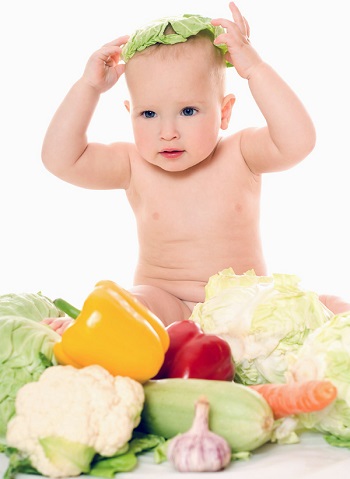Your Vegetarian Baby
By Sofia Marendali
 My partner and I are vegetarian – almost-vegan, mostly for health reasons. I stopped eating meat years ago because I didn’t want to ingest all those growth hormones, antibiotics, and the rest of the genetically-engineered stuff that most animals are being fed. And organic, grass-fed meat was just too expensive for our budget. We began to feel so much healthier not eating dairy or meat, and adopted it as a way of life. My partner and I are vegetarian – almost-vegan, mostly for health reasons. I stopped eating meat years ago because I didn’t want to ingest all those growth hormones, antibiotics, and the rest of the genetically-engineered stuff that most animals are being fed. And organic, grass-fed meat was just too expensive for our budget. We began to feel so much healthier not eating dairy or meat, and adopted it as a way of life.
When our daughter was born last year, the idea of feeding her dairy and meat really bothered me. I had heard that many pediatricians recommend that meat should be among the first solid foods your baby is introduced to – at around the eighth or ninth month. So I was nervous asking my doctor about it. Turns out she eats meat, but didn’t see any reason why Sandi couldn’t be brought up vegetarian, especially since I intend to breastfeed for at least a year – breast milk contains adequate protein for the first year of a baby’s life. She pointed out that meat is not a necessity in a baby’s or child’s diet; iron and protein are the necessities.
It is possible for your child to thrive on a vegetarian or even vegan diet, but you will have to plan carefully to ensure what she eats is nutritionally adequate and varied.
Protein
There are two kinds of protein: complete and incomplete. We require twenty essential Amino Acids; our bodies produce eleven of them and we rely on food sources to get the others. A complete protein is one that contains those nine other essential Amino Acids – sources of these include meat, eggs, dairy, and nuts and seeds. Plant foods such as legumes, grains, some vegetables and fruits, and grains are considered to contain the incomplete proteins. If your child is eating a variety of foods – and therefore different proteins – she will likely get the right balance.
Soy products are also rich sources of protein, and some vegans and vegetarians eat a lot of soy. However, there are some major concerns about negative health effects. And most soy is genetically modified. So I recommend staying away from soy foods altogether and finding other ways to get quality protein.
Iron
Your baby needs iron because it helps to make hemoglobin, the red pigment in blood that carries oxygen from our lungs to our organs and tissues. Babies have enough iron at birth, but their stores begin to be depleted by six months of age. Good vegetarian sources of iron include pulses, such as lentils and chick peas; dark green vegetables, such as watercress, broccoli, spring greens, and okra; and iron-fortified bread and cereals.
Vitamin C helps iron absorption, so your baby should consume some fruit or vegetables. Juice also works, but whole fruit is a healthier option.
Other Nutrients
Our bodies also need Vitamin B12, which is mostly found in meat, fish, and dairy products, as well as in breast milk. Vegetarian sources include some fortified breakfast cereals, yeast extract, and hard cooked eggs.
Selenium is important for proper immune system functioning. Nuts are good sources of selenium, so try offering your baby some nut butters. If you’re worried about allergies, talk to your doctor first, or try introducing one at a time; there is a line of thought that early introduction of common allergens could help prevent allergies, so you might want to research that. Other sources of selenium include bread and eggs.
One last tip: Some vegetarian food may have too much fiber and not enough calories for babies. So make sure your baby gets plenty of energy-rich foods, such as avocado and hummus. My Sandi has loved both of those right since she began to consume more than breast milk.
Sofia Marendali is the mother of Sandi and the partner of Joseph. The family lives and works on a smallholding in Oregon, USA. This article was first published in Natural Child Magazine.
|

